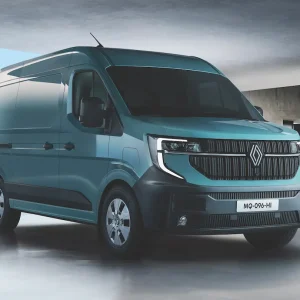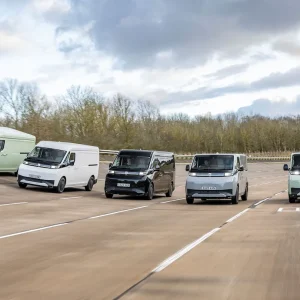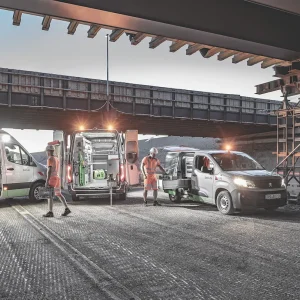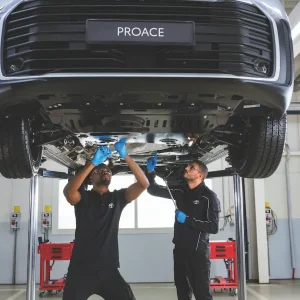Van fleet operators and owner- drivers must weigh up several different, and sometimes conflicting, factors when deciding how to rack out their vehicles’ load areas.
The need to boost fuel consumption, lighten the carbon footprint while at the same time increasing payload capacity is becoming more pressing. As a consequence, lightweight structures are increasingly in demand. But the danger is that losing weight can also reduce the strength of the units. Steel is heavier but also stronger than aluminium, so it’s a question of striking the right balance.
Safety is another vital consideration. A full bulkhead should be a pre-requisite to protect the driver from a fully laden storage system, but if the worst happens a lightweight system will do less harm.
Tools, of course, should be securely kept in place so that they cannot fly around unhindered in the event of sharp braking.
Van racking firm Tevo asks the chilling question: “What does your hammer weigh at 56mph?” It also points out that tools that rattle around when the van is in motion are subject to more wear and tear and will not last so long.
Ergonomics is important. Storing tools within easy access can reduce bending and lifting and, in turn, cut down on the chance of strains or more serious injury to staff.
Tevo, which markets Swedish-designed Modul-System products in the UK, introduced a new range last year. It claims the use of high-tensile steel combined with aluminium has enabled it to save 30% in weight compared with a conventional steel racking system.
“You can load more in the vehicle without exceeding the gross laden weight and save fuel since your vehicle is lighter,” the firm says.
Tevo’s high-strength T-Track framework enables a variety of modules to be installed into the system. The company says the system accommodates “endless racking combinations” as well as the secure attachment of accessories.
It has recently launched extra-long drawer units to fit into the framework, which it says are particularly suited for use in pick-ups and in emergency response situations. The drawers manage a load of up to 80kg and include a safety catch to stop them closing when open and in use.
Tevo claims its Modul-System Compact Series shelf system can increase storage capacity by a third compared with a conventional racking unit by having the capacity to hold four shelves in the space usually used for three. Each shelf has pull-out boxes with see-through windows that further increase storage volume.
Vario is the latest racking system available from Bott. The firm unveiled the lightweight modular storage system at the Commercial Vehicle Show in April. Incorporating Bott’s new black and grey corporate ID, the half steel, half aluminium structure is 30% lighter than the previous all-steel product.
Bott says the system has been crash-tested under the same conditions as child seats. Prices vary according to specification but a typical unit costs about £2000.
As well as undertaking volume orders for large fleets such as Centrica, Virgin, British Gas and BT, Bott also runs a bespoke, specialist vehicle conversion centre, which caters in particular for the emergency services, utilities companies, and construction and civil engineering carriers.
Bott fits out LCVs of all sizes but has developed the Bott Modulo storage system specifically for small panel vans. The product can be delivered to customers for self assembly and installation or can be installed by Bott.
Sortimo was another of the raft of racking manufacturers to display its wares at the CV Show. It specialises in producing “durable, lightweight and crash-tested solutions” for fleet and individual customers. In June it launched its Globelyst van racking system. Based on its AluSpaceFrame construction, Sortimo says shelves, drawers, boxes and service cases of various widths and depths can be integrated into the frame. The equipment is screwed to the Soboflex safety floor or the Sobogrib floor insert without requiring any drilling of the van floor itself. This means it can be easily transferred to another vehicle without leaving behind any nasty holes that won’t do residual values any favours. Globelyst is constructed of aluminium and steel and is, says Sortimo 100% recyclable.
Stafford-based firm Bri-Stor offers both bespoke storage systems and also holds a range of standard products in stock.
In April it launched its Elite Range racking system made from high-tensile steel, which is four times stronger than mild steel. Over the past five years Bri-Stor has invested heavily in the product, which it claims can only be made with the latest punching, robot folding and laser equipment. It claims it has achieved weight savings of 33% compared with its previous systems and also dramatically reduced the component count.
Racking systems have come a long way in recent years – they are stronger, lighter, safer and more ergonomic than ever before. But perhaps their most appealing characteristic is in making tools easy to find because, to invert a saying, those who are too lazy to look for anything… are tidy.





